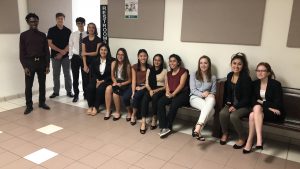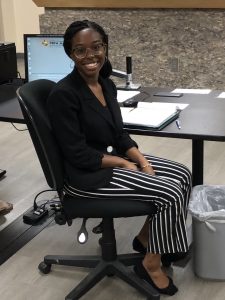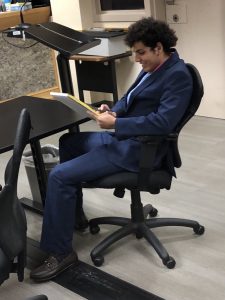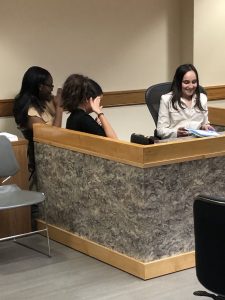 More than a dozen Wellington Speech & Debate students were in the jury pool at the Tuesday, October 29, Palm Beach Youth Court session on Gun Club Road. The second “Youth Court Experience” was an opportunity to introduce new and veteran debaters to the world of prosecuting and defense attorneys, and the legal system in general. The session included Alexander Valdes representing the state, Nailah Williams the accused, and Isabella Tombari as clerk.
More than a dozen Wellington Speech & Debate students were in the jury pool at the Tuesday, October 29, Palm Beach Youth Court session on Gun Club Road. The second “Youth Court Experience” was an opportunity to introduce new and veteran debaters to the world of prosecuting and defense attorneys, and the legal system in general. The session included Alexander Valdes representing the state, Nailah Williams the accused, and Isabella Tombari as clerk.
 The Palm Beach County Youth Court program (also known as the Juvenile First Offender Program) is a court of student peers who act as attorneys and jurors for real juvenile criminal cases. The format for Youth Court is a very impressive experience. The proceedings for the Palm Beach County Youth Court, which members of the Wellington Speech & Debate Team have participated in for years, take place Tuesdays from 530-7 p.m. at the Palm Beach County Courthouse on Gun Club Road (west of Congress Avenue) in West Palm Beach. Entrance into the building requires everyone to go through a metal detector. The youthful offenders have already admitted guilt in order to participate in the program, so he or she and his or her parent(s) meet with their “attorneys” (usually debate students) prior to the hearing to discuss the case. The attorneys are generally high school debate students, professionally dressed in suits or jacket and tie.
The Palm Beach County Youth Court program (also known as the Juvenile First Offender Program) is a court of student peers who act as attorneys and jurors for real juvenile criminal cases. The format for Youth Court is a very impressive experience. The proceedings for the Palm Beach County Youth Court, which members of the Wellington Speech & Debate Team have participated in for years, take place Tuesdays from 530-7 p.m. at the Palm Beach County Courthouse on Gun Club Road (west of Congress Avenue) in West Palm Beach. Entrance into the building requires everyone to go through a metal detector. The youthful offenders have already admitted guilt in order to participate in the program, so he or she and his or her parent(s) meet with their “attorneys” (usually debate students) prior to the hearing to discuss the case. The attorneys are generally high school debate students, professionally dressed in suits or jacket and tie.
 The judge sitting on the bench is typically a prominent attorney or member of the Adult Felony Division who volunteers time to support the project. The jury is made up of a combination of students serving jury obligations and student community service volunteers. They are sworn in before the proceedings begin. The offender is placed on the witness stand, with a microphone, and is asked questions by both the prosecution and the defense.
The judge sitting on the bench is typically a prominent attorney or member of the Adult Felony Division who volunteers time to support the project. The jury is made up of a combination of students serving jury obligations and student community service volunteers. They are sworn in before the proceedings begin. The offender is placed on the witness stand, with a microphone, and is asked questions by both the prosecution and the defense.
 Each side recommends a punishment and the jury leaves to deliberate a verdict. During that time, members of the legal community critique the student attorneys to teach them how to conduct themselves in a court of law. After the judge reads the verdict, he or she may add additional requirements such as a tour of the jail, a tour of the morgue, professional counseling, or attendance at AA meetings. A typical punishment might be 30 to 50 hours of community service, 3 to 5 jury duties, letters of apology to the parents and to the parties involved, and restitution where appropriate.
Each side recommends a punishment and the jury leaves to deliberate a verdict. During that time, members of the legal community critique the student attorneys to teach them how to conduct themselves in a court of law. After the judge reads the verdict, he or she may add additional requirements such as a tour of the jail, a tour of the morgue, professional counseling, or attendance at AA meetings. A typical punishment might be 30 to 50 hours of community service, 3 to 5 jury duties, letters of apology to the parents and to the parties involved, and restitution where appropriate.
Not only does Youth Court benefit the offender, it also benefits the students who act as the prosecution and defense. Many Palm Beach School District debate programs have had students participate in the Youth Court program the past few years, and many of these young adults have been accepted to prominent universities, where they are pursuing degrees in law, political science, international studies, and many other areas.
Youth Court is an amazing experience for students considering a future in law or the criminal justice system.
